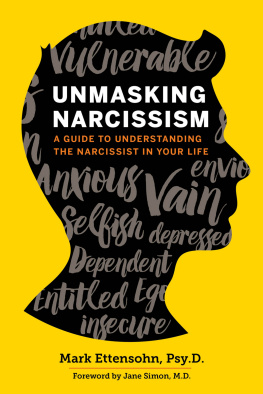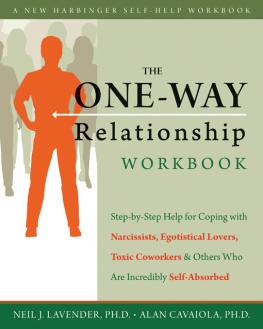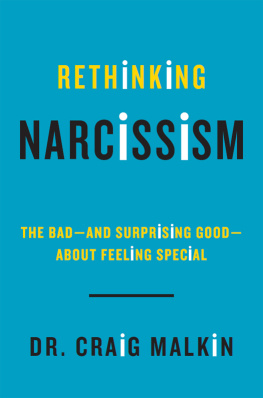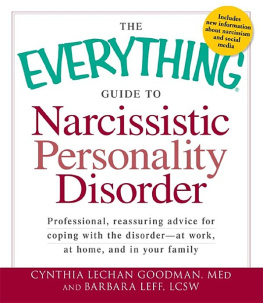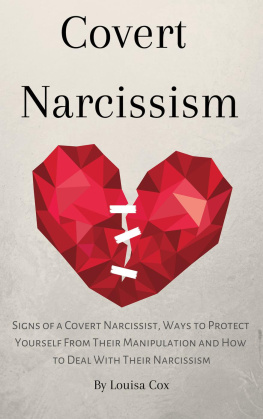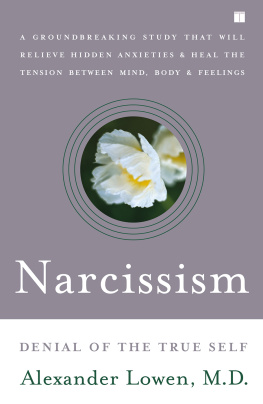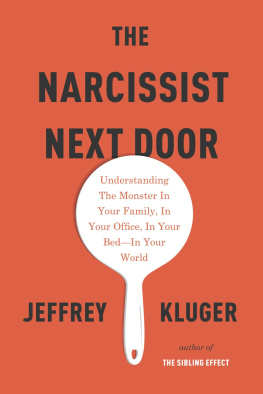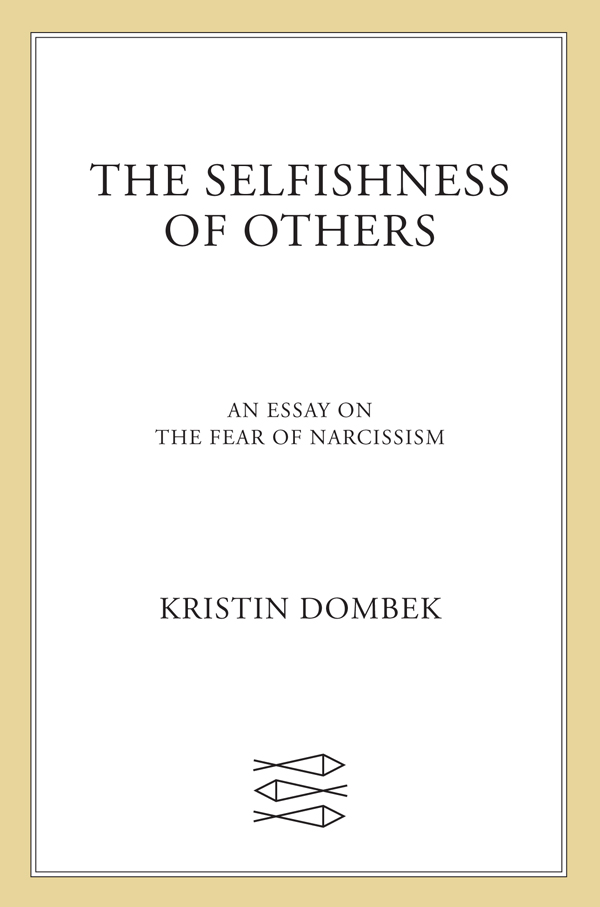Contents
Guide

The author and publisher have provided this e-book to you for your personal use only. You may not make this e-book publicly available in any way. Copyright infringement is against the law. If you believe the copy of this e-book you are reading infringes on the authors copyright, please notify the publisher at: us.macmillanusa.com/piracy.
Ill bet you think this song is about you.
Carly Simon
We know the new selfishness when we see it. Its in the laughter of the Atlanta girl who demanded the citys busiest avenue be shut down for her arrival to her sixteenth birthday party, even though there was a hospital across the street. Its in the way that, when the party planner pointed out the traffic, she said, My sweet sixteen is more important than wherever they have to be, and when he pointed out the hospital, she giggled and said that the ambulances could just go around. Its in the way she didnt give a shit about the sick and dying but did give very much of a shit when, in a store a few minutes after talking to the party planner, she was offered ugly dresses to try on, because why would she even go to her own party if she didnt look hotter than everyone else? Its in the way she not only did all this but did it shamelessly, on camera, for MTVs reality television show My Super Sweet 16 , and how, when it comes to millennials, this is just everything.
Its in the smile on the face of the professional bad boyfriend, whose website led with Im an asshole next to a picture of him with his arm around a woman with her face blanked out and Your face here printed across the blank, an image from the cover of one of the books about getting wasted and sportfucking that earned him celebrity, a small fortune, and hero status in a movement among men to obtain power over women by insulting them and regularly withdrawing or disappearing, and who also happens to have been born in Atlanta, which may or may not be important. Its in the way its getting harder to remember if there was a time before being a manipulative, shallow, grandiose asshole was something to brag about, before people shopped and exchanged one another like accessories to a personal brand.
And at its most horrifying, its in the smile on the face of the murderer. The one who set off a van bomb in a government quarter, killing eight people, and then went to an island where teenagers were at summer camp and slaughtered sixty-nine of them as they tried to run and swim away, and who, when he was arrested and photographed, smirked contentedly. The one who, when asked if he had any empathy for his victims and their families, spoke not of their suffering but of his, of how traumatic it was for him to see all that blood, who complained about a cut on his finger and said he did it all to market his manifestomore than fifteen hundred pages longagainst women and Muslims, a manifesto that, like his Facebook page, featured pictures of him smiling in Knights Templar costumes. Its in the photos and wounded rants that all the murderers now post on Facebook before they walk into schools and movie theaters with guns, as if a moments celebrity is worth any human life, even their own.
In the laughter, the smiles, the rants, and the violence we see a coldness, an absence of empathy rivaled only by a terrible need for attention. This is a kind of selfishness we increasingly fear, judging by the rising chorus that calls the young and the bad boyfriends by the same name as the murderers: narcissist.
But what is wrong with the narcissist? This is harder to know. If you see the smile on the face of a murderer, you must run. But if you are unlucky enough to love someone who seems suddenly so into himself that he doesnt care who he hurts, someone who turns from warm to gone when he doesnt need you, so self-adoring or wounded he meets criticism with violence or icy rage, who turns into another person in front of your eyes, or simply turns away when he said hed be thereif you love someone who seems to have the particular twenty-first-century selfishness in some more subtle or, worse, invisible way, you will likely go to the Internet for help. There, youll be told that, yes, your loved one has the same disorder as the murderers, a new selfishness different in scope but not in quality from those characters who are the very incarnation of what we mean when we say evil. Youll read, in that sizable portion of the self-help Internet we might call, awkwardly, the narcisphere, a story that can change the way you see everything, if you start believing in it, giving you the uncanny but slightly exciting sensation that youre living in a movie. Its familiar, this movie, as if youve seen it before, and its a creepy one, but you have the most important role in the script. Youre the hero, and the movie goes, more or less, like this.
* * *
At first, the narcissist is extraordinarily charming, even kind and sweet. Then, after a while, he seems full of himself. It could be a he or a she, but lets stick with he. Thats what you start to think, when you know someone like this: hes full of himself. But the narcissist is empty.
Normal, healthy people are full of self, a kind of substance like a soul or personhood that, if you have it, emanates warmly from inside of you toward the outside of you. No one knows what it is, but everyone agrees that narcissists do not have it. Disturbingly, however, they are often better than anyone else at seeming to have it. Because what they have inside is empty space, they have had to make a study of the selves of others in order to invent something that looks and sounds like one. Narcissists are imitators par excellence. The murderer plagiarized most of his manifesto, obviously and badly, but often narcissists are so good at imitating that you wont even notice. And they do not copy the small, boring parts of selves. They take what they think are the biggest, most impressive parts of other selves, and devise a hologram of self that seems superpowered. Lets call it selfiness, this simulacrum of a superpowered self. Sometimes they seem crazy or are really dull, but often, perhaps because they have had to try harder than most to make it, the selfiness theyve come up with is qualitatively better, when you first encounter it, than the ordinary, naturally occurring selves of normal, healthy people. Narcissists are the most popular kids at school. They are rock stars. They are movie stars. They are not all really rock stars or movie stars, but they seem like they are. They may tell you that you are the only one who really sees them for who they really are, which is probably a trick. If one of your parents is a narcissist, he or she will tell you that you are a rock star, too, which is definitely a trick.
Because for the narcissist, this appreciation of you is entirely contingent on the idea that you will help him to maintain his selfiness. If you do not, or if you are near him when someone or something does not, then God help you. When that picture shatters, his hurt and his rage will be unmatched in its heat or, more often, its coldness. He will unfriend you, stop following you, stop returning your emails, stop talking to you completely. He will cheat on you without seeming to think its a big deal, or break up with you, when he has said hed be with you forever. He will fire you casually and without notice. Whatever hurts most, he will do it. Whatever you need the most, he will withhold it. He cannot feel other peoples feelings, but he is uncannily good at figuring out how to demolish yours. When this happens, your pain will be the pain of finding out that you have held the most wrong belief that youve ever been stupid enough to hold: the belief that because this asshole loved you, the world could be better than usual, better than it is for everyone else.



